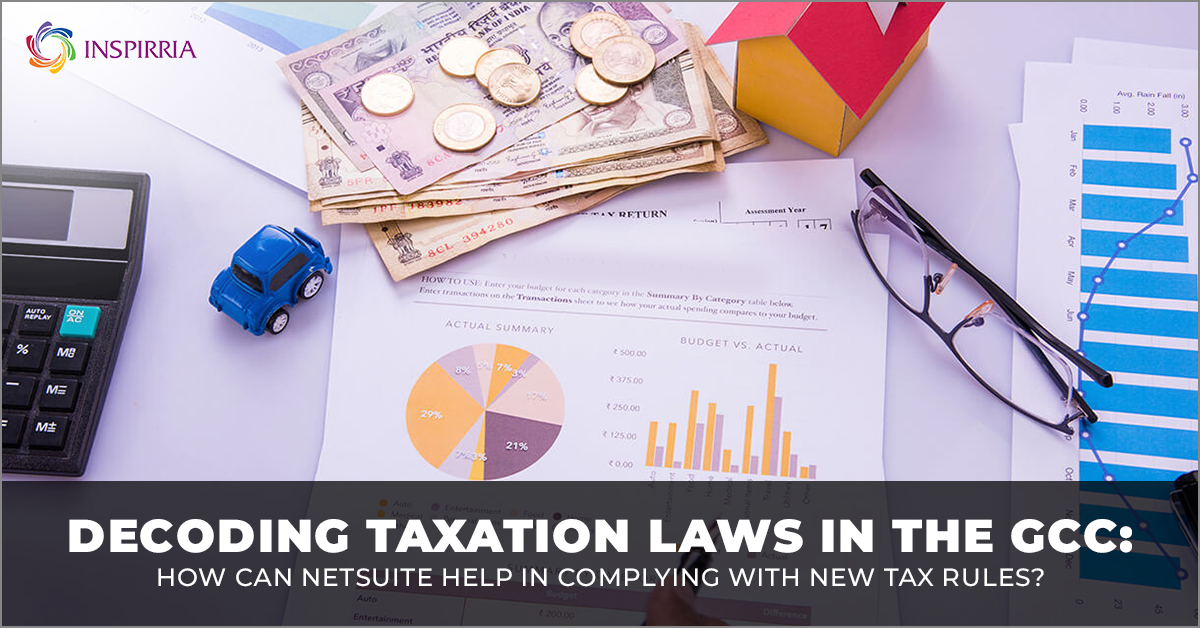You are here
Decoding Taxation Laws In The GCC: How Can NetSuite Help In Complying With New Tax Rules?

GCC or Gulf cooperation council is a union of all Arab nations, except Iraq. The countries that are part of the GCC are Bahrain, Oman, Kuwait, Qatar, Saudi Arabia, and UAE.
Here are the different types of taxes, that are applicable in GCC nations:
Corporate Tax: Businesses are required to pay the corporate tax, although this rule is different for different GCC nations. For example in the UAE, corporate tax is only applicable to oil companies, and foreign banks. However, the taxation rules will change from 2023.
Withholding Tax: When the income generated in any GCC nation is transferred to another nation, then withholding tax is applicable. Both corporations and individuals are required to pay this tax.
Zakat: Zakat is an Islamic tax, applicable to all abled citizens to serve the needy ones.
VAT: Although GCC was formed in 1981, it wasn’t until 2015, that they decided to introduce VAT or Value Added Tax in their respective nations. In 2016, all 6 nations signed the VAT Agreement that allowed them to impose a 5% tax on some products and services, except health and education.
Although in Saudi Arabia and UAE, the introduction of VAT was smooth, other nations took their own time to streamline the tax impositions and frame the rules.
VAT is an indirect tax and is applicable to the movement and transactions of goods and services. In UAE, VAT was applicable from January 1st, 2018, and the Kingdom of Bahrain was the last to implement VAT, from January 1st, 2022.
Excise Tax: Excise Tax is an indirect tax that is imposed on those products and goods which are harmful to humans and the environment. All GCC nations signed the Excise tax agreement to impose excise tax.
Customs Duty: Whenever any product is imported into any GCC nation, customs duty is imposed on the invoice value of that good. The percentage of the excise duty varies, depending on the type of the product, and the country where that product is being imported.
Stamp Duty: Stamp duty is imposed on the legal documents, such as transfer of the real estate, registration of a new owner, ownership of a new property, and more.
Localization Of Direct, Indirect Taxation In GCC: The Solution
Complying with the direct and indirect taxation in the GCC nations can be overwhelming, and complicated. And in case any entity fails to report and file the taxes, then there will be penalties and punishment as well.
Inspirria, which is an award-winning Oracle NetSuite Implementation Partner, has over 15 years of experience in Cloud computing and empowering businesses with cutting-edge technology solutions in the domain of taxation, financials, and all aspects of business operations.
We have a presence in UAE and have partnered with several corporations and SMEs from UAE for deploying Cloud ERP and solving their taxation problems. Our feature-rich solutions for GCC taxes can not only automate critical activities related to taxation but also ensure that your business is fully compliant with all the taxation rules.
Schedule a no-obligation, free assessment of your business right away!


